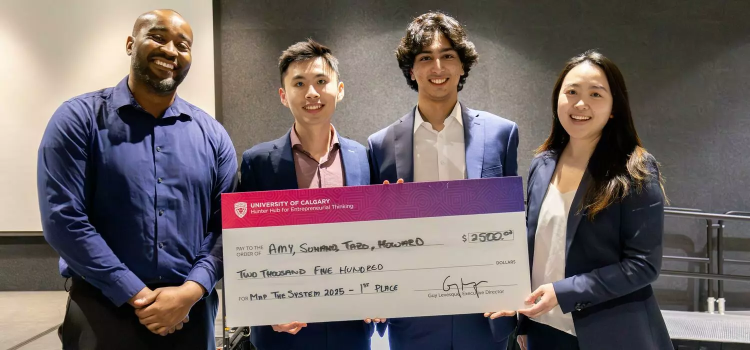In early April, eight teams competing in the Hunter Hub for Entrepreneurial Thinking's Map the System program presented their findings to a team of judges. The winning team chose to explore hip and knee surgery wait times in Alberta. Barriers to health care for Indigenous people, and the rise of negative sentiments towards immigration in Alberta, were also investigated by participants.

From left: Kurt White, with UCalgary Map the System winners Howard Leong, Taro Lakra, and Amy Chen. Photo Credit: Hunter Hub
"Entrepreneurial thinking is often associated with starting a business, but it's so much more than that," says Kurt White, social innovation specialist at the Hunter Hub for Entrepreneurial Thinking. "It's about seeing the opportunities that exist in every challenge, thinking outside the box, and finding creative ways to bring about meaningful, lasting change. Map the System helps you recognize that every obstacle can be an opportunity, that every idea has the potential to make a difference."
Map the System is a global competition hosted by the Skoll Centre for Social Entrepreneurship at the University of Oxford, delivered in collaboration with educational institutions around the world. Participants are asked to address complex societal issues using a systems thinking approach. Systems thinking is a holistic approach to problem solving that views the world, including problems and solutions, as interconnected elements, rather than isolated parts.
At the University of Calgary, Map the System is offered as a co-curricular program for students and recent alum through the Hunter Hub for Entrepreneurial Thinking. UCalgary has participated in the program since 2021.
Using systems thinking as a guiding approach, participants explore some of today's most complex issues, with support from workshops, one-on-one coaching, and various resources as they dive into their chosen topic.
"This program allows the next generation of changemakers to take their first steps toward building a future that will positively impact the world, which is why this is such a meaningful program to us here at the Hub," says White.
The power of a multidisciplinary team
The 2025 winning team, led by Amy Chen, Sunand Kannappan, Taro Lakra, Howard Leong, and Kapilan Panchendrabose received a $2500 prize. Exploring hip and knee surgery wait times in Alberta, their biggest takeaway from the program was the value of a transdisciplinary team.
"We're not all the same; we come from very different backgrounds, very different educational and professional experiences," say Lakra. "Having the discussions we had really elevated our project to a whole new level." The team hails from science, finance and economic and data science backgrounds.
"This was such an incredible opportunity to present our work," Chen says. As they move forward to the Banff Systems Summit, the team is excited to continue learning and refine their project. Further, they're excited to meet other teams exploring similarly complex issues.
"This program is a great way to meet changemakers who think about social issues and how to solve them that's what drew us to Map the System," says Leong.
Second place went to Yansing Huang, who addressed barriers to health care for Indigenous Peoples of Canada. Third place went to Esther Choi, Amber Quo, and Seniru Ruwanpura, who explored the rise of negative sentiments towards immigration in Alberta. Both teams also received prizes.
The judges were Dr. Colin Dalton PhD, Tara Barnas, and Sarelle Azuelos.
Canadian National Finals at The Banff Systems Summit
The Banff Systems Summit will take place May 19 to 22, where winners of campus competitions from across Canada share their research. From there, the top team from every participating institution will have the opportunity to compete in the Global Finals at the University of Oxford from July 3 - 6, 2025.
Subscribe to the Hunter Hub newsletter to stay up to date on Map the System and more.











